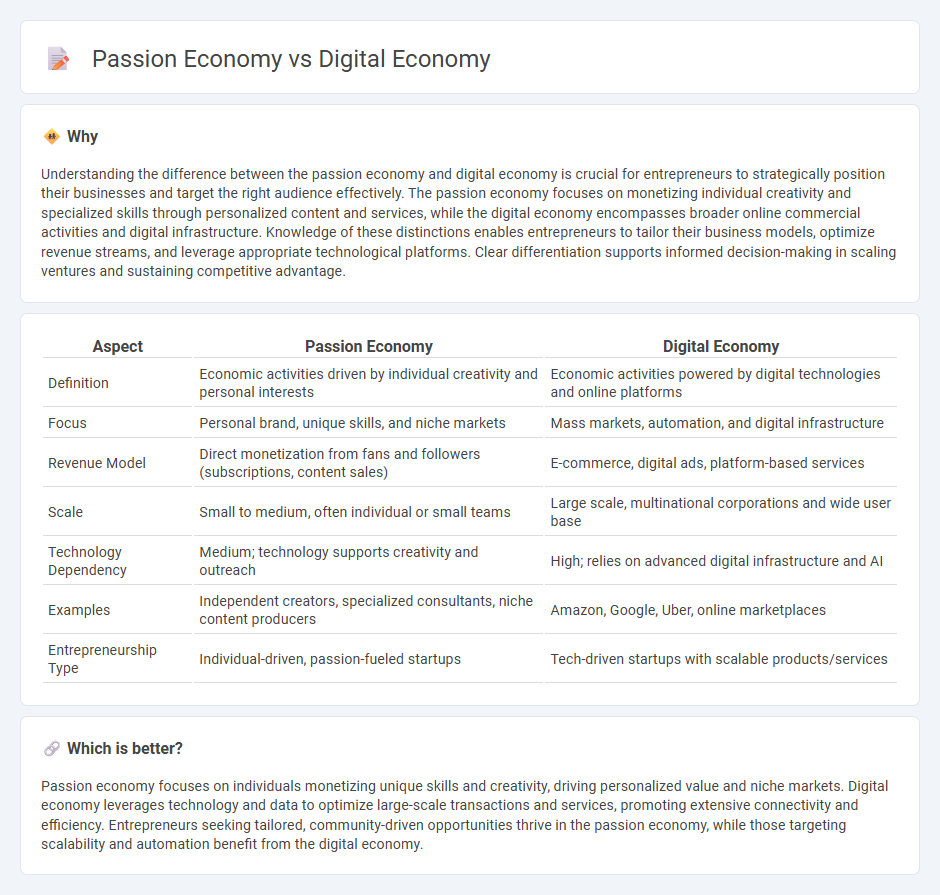
Passion economy emphasizes individual creativity and niche skills monetized through personalized digital platforms, enabling entrepreneurs to build unique personal brands. Digital economy broadly covers the exchange of goods and services through online technologies, focusing on scalability and automation in global markets. Explore how these evolving economies shape modern entrepreneurship and unlock innovative business models.
Why it is important
Understanding the difference between the passion economy and digital economy is crucial for entrepreneurs to strategically position their businesses and target the right audience effectively. The passion economy focuses on monetizing individual creativity and specialized skills through personalized content and services, while the digital economy encompasses broader online commercial activities and digital infrastructure. Knowledge of these distinctions enables entrepreneurs to tailor their business models, optimize revenue streams, and leverage appropriate technological platforms. Clear differentiation supports informed decision-making in scaling ventures and sustaining competitive advantage.
Comparison Table
| Aspect | Passion Economy | Digital Economy |
|---|---|---|
| Definition | Economic activities driven by individual creativity and personal interests | Economic activities powered by digital technologies and online platforms |
| Focus | Personal brand, unique skills, and niche markets | Mass markets, automation, and digital infrastructure |
| Revenue Model | Direct monetization from fans and followers (subscriptions, content sales) | E-commerce, digital ads, platform-based services |
| Scale | Small to medium, often individual or small teams | Large scale, multinational corporations and wide user base |
| Technology Dependency | Medium; technology supports creativity and outreach | High; relies on advanced digital infrastructure and AI |
| Examples | Independent creators, specialized consultants, niche content producers | Amazon, Google, Uber, online marketplaces |
| Entrepreneurship Type | Individual-driven, passion-fueled startups | Tech-driven startups with scalable products/services |
Which is better?
Passion economy focuses on individuals monetizing unique skills and creativity, driving personalized value and niche markets. Digital economy leverages technology and data to optimize large-scale transactions and services, promoting extensive connectivity and efficiency. Entrepreneurs seeking tailored, community-driven opportunities thrive in the passion economy, while those targeting scalability and automation benefit from the digital economy.
Connection
The passion economy fuels entrepreneurship by enabling individuals to monetize unique skills and creative talents through digital platforms, driving personalized consumer experiences. Digital economy infrastructure, including online marketplaces, social media, and payment systems, facilitates accessible global reach and scalable business models for passion-driven entrepreneurs. This synergy accelerates innovation, niche market development, and economic diversification within the entrepreneurial ecosystem.
Key Terms
Platform
The digital economy revolves around large-scale platforms like Amazon and Google that facilitate global transactions and data exchange, emphasizing scalability and network effects. In contrast, the passion economy centers on niche platforms such as Patreon and Substack, empowering individual creators to monetize unique talents and foster direct relationships with audiences. Explore how these platform models shape economic opportunities and transform value creation in the digital age.
Monetization
The digital economy primarily relies on mass-market monetization strategies such as advertising revenue, online sales, and subscription models, leveraging scale and broad user bases. In contrast, the passion economy centers on individualized monetization methods, including direct fan support, personalized content, and niche community engagement, emphasizing creator autonomy and unique value propositions. Explore how these distinct monetization frameworks are reshaping economic opportunities in the digital age.
Niche
The digital economy leverages broad online platforms facilitating mass transactions and large-scale digital services, while the passion economy emphasizes niche markets where individuals monetize unique skills and personalized content. Niche-focused creators in the passion economy harness specialized expertise to build highly engaged communities, enabling direct monetization through subscriptions, crowdfunding, and exclusive offerings. Explore how focusing on niche markets in the passion economy can transform your digital presence and revenue streams.
Source and External Links
Digital economy - Wikipedia - The digital economy describes how traditional economic activities are transformed by Internet technologies, with digital connectivity and ICT driving productivity and new business models, shaping work, regulations, and global interactions.
What is the Digital Economy? | Definition from TechTarget - The digital economy consists of economic activities enabled by digital connections among people, businesses, and data, shaped by trends like AI, 5G, metaverse, and digital transformation across sectors including agriculture and healthcare.
Digital economy | EBSCO Research Starters - The digital economy encompasses economic transactions facilitated by the Internet and digital technologies, evolving rapidly through computing advances, and raising issues such as market concentration and data privacy alongside vast business opportunities.
 dowidth.com
dowidth.com